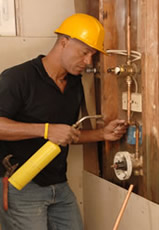Plumbers versus Plumbing Contractors: What's the Difference?
Homeowners often wonder what the distinction is between plumbers and plumbing contractors, and there is a difference between the two. Basically, if you have a common problem in your home's plumbing system (such as a clogged drain, leaky faucet, etc.) a plumber is the person that you are most likely to deal with. A plumbing contractor deals almost exclusively with new constructions, remodeling, and renovation, handling the plumbing tasks that involve the home's water supply, septic system, etc. Most small plumbing companies in your area are likely owned by a plumber who may also be a plumbing contractor.
What Can a Plumber Do?
Plumbers are usually the first people that homeowners turn to with a plumbing emergency, and can usually handle everything from burst pipes to toilets that overflow - all minor repairs of the plumbing system. A plumber may be officially trained or apprenticed under another plumber to receive informal training. Installation of common plumbing fixtures like faucets, toilets, sinks, bath tubs, showers, shower drains, food disposers, hot water dispensers, and more can be done by a plumber. Most plumbers are very experienced with these common plumbing tasks around the home.
What Can a Plumbing Contractor Do?
Plumbing contractors can do more complex tasks than a plumber, as well as all of the tasks that a plumber can do. You might find a plumbing contractor working to construct the home's waste disposal system, installing gas connections and flues, or even working on water heaters, including gas or electric, or tankless styled heater. Plumbing contractors also install gas control valves, back flow prevention, water conditioning and softening equipment, and other devices and appliances that might be connected to your home's water system that require a professional installer. The plumbing contractor can also be involved in maintenance and repair of any of the above parts of your home's water supply. This is not a complete description of all of the tasks that a plumbing contractor can be involved in. Most plumbing contractors are trained in handled construction and service for nearly any request. Plumbing contractors may also be called in as consultants during a home's planning stages, and are very instrumental in making sure that a new construction or existing repair is in compliance with local, state, and federal building codes, and also that commercial plumbing complies with all requires of the Americans with Disabilities Act (ADA compliant). The final inspection of plumbing work is usually completed by a plumbing contractor in the new construction phase.
Hiring a Plumber of Plumbing Contractor
For basic plumbing needs, every homeowner should have a plumber that they can turn to. Sometimes, hiring the best plumber may happen after a referral from friends or neighbors in your area that have dealt with a particular plumber before. Local home supply stores can often refer a plumber to you as well. Of course, there is always the Yellow Pages, but be sure to ask about the plumber's experience and whether or not he is licensed, bonded, and has insurance. Finding a plumbing contractor is a bit more difficult; again, referral from other homeowners who have used a contractor may be the best way to find a reputable plumbing contractor. For new home constructions, your general contractor or builder will likely recommend a plumbing contractor that he is familiar with and has worked with before in the past. While most plumbers expect payment on the day of service, or in a timely manner once they have sent out an invoice, many plumbing contractors require that you pay a deposit on their work upfront before they lift a finger. A deposit of no more than ½ of the job estimate is normally collected in advance and deducted from the total cost of the project when it is completed.
|
|



